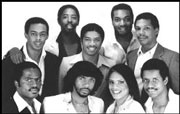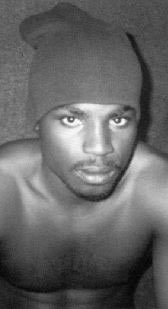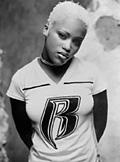After my dad got burned in a carburetor explosion at the auto repair shop he owned and managed, my mom got plucked out of full-time Jon-care and found herself back earning bread. She was the type of woman to have books with titles like Boss Lady on the shelf; empowerment wasn’t a new concept for her. On summer days, when I didn’t have school, or during the rest of the year when my mom would pick me up from my grandma’s house after a long day at the shop, we’d ride around in the car— often longer than necessary—and blast the sometimes sanguine, always sappy slow jams dripping off the WBLS frequency.
In New York, where I grew up, BLS was the outlet for mature black pop of all ages and distinctions. At times, its repertoire skewed younger, with hip-hop mix shows filling in the gaps between old-folks programming. But most of the time, it was love: sweet love, failed love, wrong love, right love. As we sang along, my mom was always fitfully out of key (as was I, though I refused to acknowledge it at the time). Neither one of us had the pipes, though we certainly fancied ourselves soul stirrers (hey, Don Cornelius had once asked mom to dinner).
Right about then, in the mid-’80s, black pop—true pop—couldn’t be found much outside the BLS stratum. Only the few who followed the R&B chart more intensely than the pop one were privy to these devastating songs, nuggets far more transcendent than the pop schlock on WPLJ, the Top-40 poison for which BLS had become my antidote.
I remember one of the first moments I understood my mother’s daily pilgrimages to the soot-thick, greasy, decidedly masculine body shop to be something other than ordinary. In “Secret Lovers,” the breakout male-female duet ballad by Atlantic Starr, Barbara Weathers lamented her fate as a married woman doomed to love a married man—and not the one she’s married to. She pleads, “Sitting at home, I do nothing all day/But think about you, and hope that you’re OK.” Doing nothing all day seemed strange to me—none of the women in my life had that luxury. That era saw women hitting the workforce ever more aggressively, yet “Secret Lovers” championed the less-fashionable character of the stay-at-home wife. Triumphant, shameful, and ultimately unresolved, the song was an R&B smash—and it made noise on pop airwaves as well. Deftly and skillfully, what the group had done was give infidelity a good name (“How could something so wrong be so right?” sang David Lewis) and give homemakers some respect, dalliances or not. That a song preaching such suspicious mores could be a hit was a testament not only to the complexities of black pop but to the songwriting and arranging skills of the Lewis brothers. When my mom and I sang along to it, we did so emphatically, politics notwithstanding.
A couple of years later, I’d graduated to junior high school, and Atlantic Starr were back with their second major crossover hit, “Always.” It was a far more optimistic moment for the group, especially because their biggest moment since “Secret Lovers” was the saccharine lite-jazz of “If Your Heart Isn’t in It,” a song that could have wallowed in its own inanity but was redeemed by the practiced duet of Weathers and Lewis.
At that time, I wasn’t going to grandma’s house after school quite as often, as I was the proud possessor of a dupe key for our front-door lock. Girls became a reality (Danielle, are you out there?), or a fantasy, and “Always” was nothing if not the mantra of young fools in love. “Girl, you are to me/All that a woman should be,” crooned Lewis at the song’s beginning. It was weak without losing strength, and when Weathers crooned back, “A love like yours is rare/ It must have been sent from up above,” the sentiment was shared. The deal was sealed on the chorus where, caught up in the rapture, they praised, “Ooh you’re like the sun, chasing all of the rain away/ When you come around, you bring brighter days.”
It’s faultless songcraft, the type of song that makes a lot of sense right at the cusp of puberty. I was seeing my mom less those days, and I typically had the radio to myself. Even though, more often than not, hip-hop was leaking out of those speakers, BLS still held a certain amount of comfort for me, and late at night, before I went to bed, I’d find those songs and sip their soothing elixir. They were songs I sang by myself, learning them in anticipation of soon having a new partner in off-key singing.









